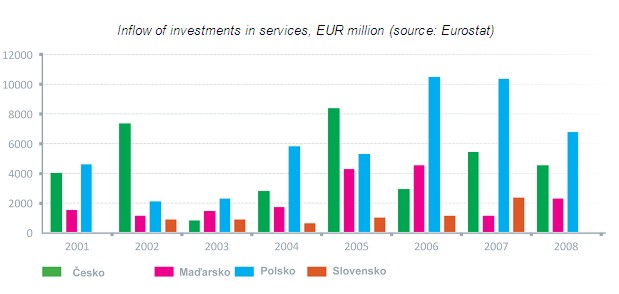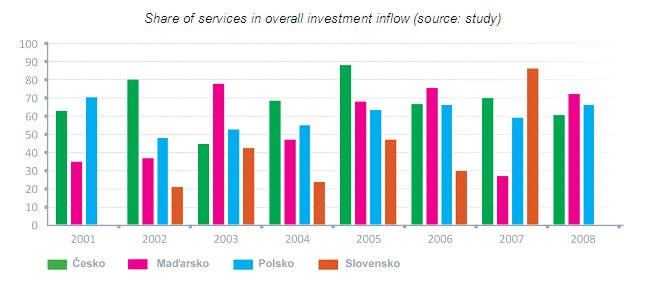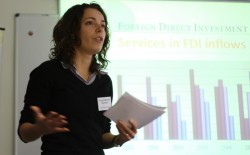Czech Republic among the absolute leaders of Central and Eastern Europe in the inflow of services investments
22 Feb. 2010 | CzechInvest | Research: Visegrad four countries attract 70% of all investments in services in Central and Eastern Europe. The Czech Republic, Hungary and Poland set records.
The Czech Republic ranks among the absolute leaders in terms of the inflow of investments in business services in Central and Eastern Europe. The countries of the Visegrad Four grouping, i.e. the Czech Republic, Poland, Hungary and Slovakia, jointly attract a full 70% of all investments in business services in the CEE region. The top investment destination in absolute numbers is Poland, whereas the Czech Republic and Hungary have achieved outstanding results in terms of per capita investment. This is according to long-term research conducted by the Economy and Society Trust and the University of Herefordshire in Great Britain and sponsored by the International Visegrad Fund. The results of the groundbreaking research, which is the first of its kind, were released today.
“Services account for an ever greater share of global foreign direct investments. At the beginning of the 1990s, services comprised perhaps half of all such investments; today that figure is nearly 60%,” says Jan Drahokoupil, head of the research project. “This is apparent also in the Visegrad countries. Since 2000, 70% of foreign investments in the Czech Republic have been focused on services, 60% in Poland, 55% in Hungary and 40% in Slovakia.”
This is confirmed by statistics from CzechInvest, which assisted with the organisation of the concluding expert discussion on the research results. “Four out of every five new investment projects with which we assisted last year involved services or research and development,” emphasises Alexandra Rudyšarová, acting CEO of CzechInvest. “The Czech Republic is attractive primarily due to it combination of skilled workers, good infrastructure and favourable location.”
“According to the research results, the main motivation for relocating or establishing international shared-services centres in the Visegrad Four countries is cost savings. Particularly wage levels of experienced workers play an important role, though investors comprehensively assess individual countries according to their price/quality ratio. According to the companies that we addressed, Hungaryhas the best results in this area, together with the Czech Republic and Poland. However, labour costs in these countries are rising relatively quickly, which is opening the door for Slovakia as well as Romania and Bulgaria. Today Romania and Bulgaria most frequently accompany the Visegrad Four countries on the list of countries that investors are choosing,” explains Martina Fifeková, a member of the research team.
“Hungary is attractive particularly thanks to its very favourable price/quality ratio,” says Miklós Csuhay, director of investment projects at the Hungarian Investment and Trade Development Agency. “The great majority of investments comprise reinvestments, which illustrates the quality of our business environment. It looks a bit as though those who aren’t in Hungary yet can choose among the Visegrad Four countries, but those who are already in Hungary aren’t changing their minds and are expanding here.”
Marián Jánošík of the Slovak investment agency SARIO adds: “The Slovak Republic is an attractive investment destination, which is demonstrated by the practically daily inquiries and discussions with potential investors that take place at SARIO. Investors mainly appreciate Slovakia’s introduction of the euro, its transparent tax system and skilled workforce. From the perspective of anticipated economic development, the International Monetary Fund forecasted that we would have the highest growth rate in the euro zone at 3.7% and other respected economic institutions have issued similar forecasts.”
Historical development
The transition from central planning to a market economy at the beginning of the 1990s represented a tremendous opportunity for companies that began to offer within the internal markets of the individual Visegrad Four countries previously unavailable services required for business – banking, insurance, legal and business consulting and auditing. Investments aimed exclusively at the domestic market comprised the absolute majority of new investments in services until the turn of the millennium.
A change occurred around the year 2000. “This turning point reflects a global economic trend where an ever greater share of foreign direct investments is comprised of projects when a company decides to divide individual parts of its business according to function and then subsequently detaches them from individual national markets so that they can be centralised in a single large services centre. Whereas in the case of the preceding type of investments decisions were based only on the size of the domestic market, with this type of projects the quality of the country’s business environment is a key factor,” explains Magdolna Sass, who was responsible for the Hungarian part of the research. “It is important to mention that the very existence of such investments has spurred the boom in communication technologies in recent years.”
“This type of investments has undergone certain development in individual countries,” says Stanislav Kutáček, director of the Economy and Society Trust. “Investors first focus rather on simpler internal services – primarily finance and accounting – that do not require contact with the customer, and then services for clients and other more demanding areas with higher added value. In Hungary, Poland and Slovakia, all areas of business are equally represented, whereas in the Czech Republic information technologies and software development have a substantially higher share.”
Only one percent of the market
However, shared services based in the Visegrad Four countries comprise not more than one percent of the global market. “This is a somewhat surprising result that contradicts the idea that the establishment of such centres would somehow result in a substantial relocation of skilled jobs from older member states to new ones,” adds Sass. According to the authors of the study, there are approximately 1,400 to 1,500 shared-services centres in Europe. Of these, 150 to 180 operate in Central and Eastern Europe, mainly in the Czech Republic, Hungary and Poland, each of which has attracted slightly more than 50 such projects.
“However, this represents an outstanding opportunity for the near future,” says Alexandra Rudyšarová. “The current state of the world economy is forcing companies to seek out more savings. If we look at labour costs in the old and new EU member states, the difference is obvious. In the Czech Republic it is true that there is not any difference in quality, which is positively apparent in the further inflow of investments.”


For more information please contact the CzechInvest Press Centre
Lucie Kocourková, spokesperson, phone: +420 296 342 538, lucie.kocourkova@czechinvest.org
Contact to the Economy and society trust
Stanislav Kutáček, director, tel.: +420 542 213 374, testrast@gmail.com
Contact to SARIO
Marián Jánošík, spokesperson, tel.: +421 2 58 260 131, janosik@sario.sk
Contact to ITDH
András Váczi, marketing and communication director, tel.: +36 1 472-8100, info@itd.hu
Contact to PAIIIZ
Krystyna Olesińska, spokesperson, tel.: +48 (0) 22 334 98 23, krystyna.olesinska@paiz.gov.pl












